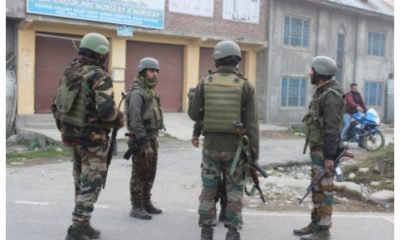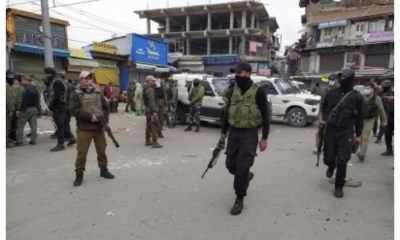Crime
More ‘surgical strikes’ in offing in Kashmir University
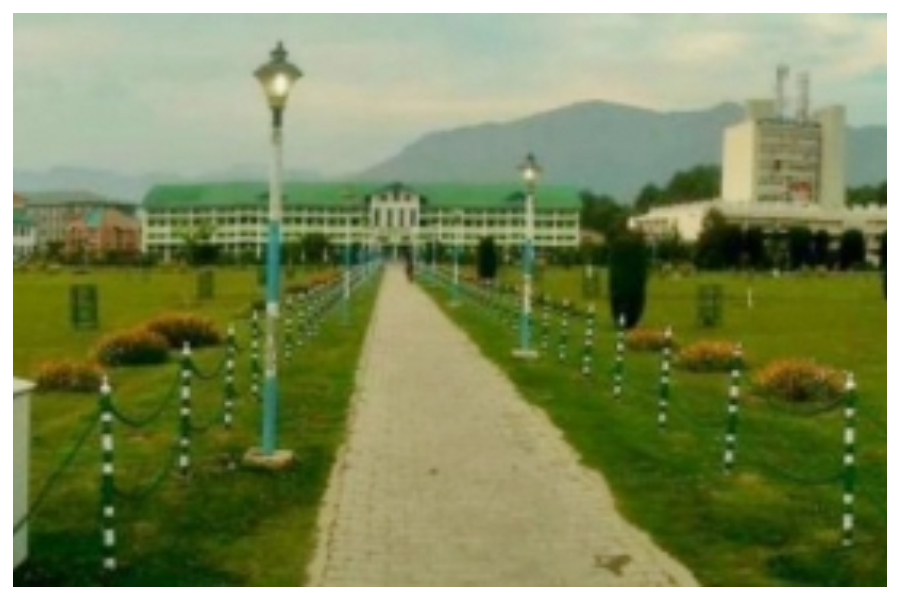
Hardly a week after he got the Ph.D. degree from Kashmir University, Rafi Bhat was killed on May 6, 2018 along with four other militants in Shopian district.
Rafi was serving as an assistant professor in the sociology department of the University on a temporary basis.
Two days before he was killed in an encounter in Shopian district, Rafi Bhat, had put out a series of Facebook posts, which indicated that he had shared his plan to give up teaching and pick up arms with his students.
Rafi served as an archetypal example of what had been going on in the University for over three decades. The ‘infiltration’ of secessionist elements and their ideologues into the various departments and administrative sections has been no secret.
The ‘secessionist intellectualism’ had found its ultimate seminary in Kashmir University with the shameful murder of its Vice Chancellor, Mushirul Haq and his secretary, Abdul Gani Zargar whose bodies were found on April 10, 1990, four days after the duo was kidnapped by the terrorists from their office in the University.
Valley’s highest seat of learning remained under the de facto control of the secessionists who ensured their control by positioning ‘loyalists’ at vital positions in academia and administration.
The only debate in the inner circles of this University for three decades was whether Kashmir should become independent or merge with Pakistan. Remaining a part of India was out of the question.
The radicalisation of the University was so complete that even admissions to various departments were done on recommendation of the secessionist leaders and militant commanders.
Shootouts between those who stood for ‘independence’ and those for merger with Pakistan were reported from within the campus during the mid 1990s.
Intelligence agencies, both Central and state, had mountain loads of inputs about the radicalisation of the University students.
As a senior intelligence officer put it, “Those were reports, but not all of them had actionable inputs and whenever we got actionable inputs, we acted.”
In layman terms, ‘actionable input’ meant the presence of a militant with weapons or presence of some communication network or any information about a wanted person hiding inside the campus.
What unfortunately was missed during all the past years was that for creating the ‘soldiers of Jehad’ you don’t need the presence of weapons.
The nurseries of ‘Jehad’ are nurtured in young and intellectually impressionable minds and that was what had been happening in the University.
Interestingly, even during the official functions where the chancellor (state Governor) and the vice chancellor would be present, no student would stand up in deference to the national anthem.
The worst part of that story was that even some of the faculty members would also refuse to stand up when the national anthem was being played.
The recent dismissal of professor Altaf Hussain Pandit of the University’s chemistry department has proved that the intelligence agencies have been able to find what they call ‘actionable evidence’.
Pandit’s dismissal could be the beginning of an ‘operation clean up’, the Lt. Governor Manoj Sinha’s government has decided to undertake in the University.
Post abrogation of Article 370, two discreet analyses of the academic and student activities in Kashmir University have been carried out, said top intelligence sources.
These analyses have shown that “Three faculty members have been contaminated to an extent that requires immediate action.
“12 faculty members have been found contaminated to a lesser extent that needs a graded response.
“24 members of different faculties are contaminated to an even lesser extent who need counselling and observation,” intelligence sources revealed.
The intelligence reports have also suggested long term measures to carry out reforms to ensure a free academic atmosphere in the University and also an atmosphere for recruitments that is free from nepotism, corruption and favouritism.
Presently, the intelligence agencies are carrying out analyses of the non-teaching staff.
What becomes clear from these intelligence reports is that in the not very distant future, the University would see more heads rolling to restore the academic excellence for which the University was once famous.
Crime
Mumbai Airport Customs Arrest Three Women Smuggling Marijuana Worth ₹6.46 Crore From Bangkok
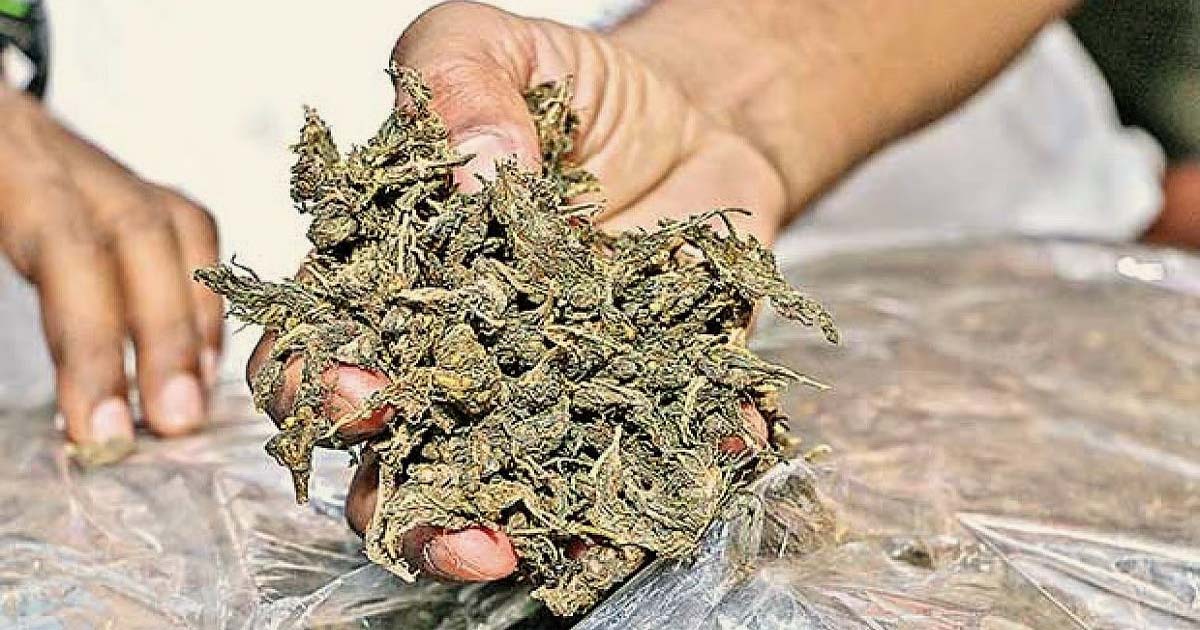
Mumbai: The Mumbai Airport Customs officers on Sunday arrested three women — Shabana Begum Shaukat Ali, Tarannum Jahan Shahabuddin Khan, and Sharifa Haidar Mulla for allegedly smuggling marijuana valued at Rs 6.46 crore. The trio had arrived at Chhatrapati Shivaji Maharaj International Airport (CSMIA) from Bangkok on the same PNR when officers intercepted them following specific intelligence inputs about potential contraband.
Customs officials recovered a total of 6,464 grams of greenish substances, purportedly marijuana (ganja), concealed in lumps. The seized narcotic comes under the Narcotic Drugs and Psychotropic Substances (NDPS) Act, which imposes stringent penalties for illegal possession, transport, and smuggling.
During questioning, the women admitted that they were aware of the severe punishment for smuggling drugs into India. Shabana Begum revealed that she was offered Rs 15,000 by a friend to bring marijuana from Bangkok. Tarannum Jahan and Sharifa Haidar agreed to the same arrangement for a similar payment.
The Customs officer stated that preliminary investigations indicate the involvement of additional individuals who remain unidentified. Authorities are working to trace and apprehend the key members of the drug cartel behind this smuggling operation.
The arrested women were produced before the court on Sunday, with public prosecutor Nazia Shaikh representing the Customs department. Further legal proceedings are ongoing as investigations continue.
Crime
Rave party serving liquor in dry-state Gujarat raided; 15 detained

Ahmedabad, Oct 25: Police raided a rave party in Gujarat’s Ahmedabad, leading to the detention of 15 people who were consuming alcohol in the dry state.
The Bopal Police acted after receiving a tip-off about the party at Zephyr Farmhouse near Shilaj, where both liquor and drugs were reportedly being used.
Upon reaching the venue, police found 15 individuals, including 13 foreign nationals from Nigeria, Mozambique, Kenya, and other African countries, alongside two Indians, intoxicated.
Investigations revealed that the organisers had printed special passes for the party, advertising “unlimited alcohol”, showing the scale and planning behind the event.
All 15 attendees have been detained, a case has been registered, and further inquiries are underway to identify the main organisers, the farmhouse owner, and the source of the liquor in a state where alcohol is banned.
Gujarat has maintained a strict prohibition on alcohol since 1960 under the Gujarat Prohibition Act, 1949, which bans the sale, consumption, and manufacture of liquor across the state.
The law applies to all forms of alcoholic beverages, including Indian-made foreign liquor (IMFL), country-made liquor, and spirits. Exceptions exist only for medicinal, industrial, and export purposes, subject to government permission. Violations of the Act carry severe penalties, including imprisonment, fines, and seizure of property involved in the illegal trade.
Despite Gujarat’s strict prohibition laws, the illegal liquor trade remains a significant issue.
In 2024, authorities seized approximately 82 lakh bottles of liquor valued at Rs 144 crore across the state. Ahmedabad alone accounted for over 4.38 lakh bottles, with 2,139 cases involving IMFL and 7,796 cases related to country-made liquor. Notably, the State Monitoring Cell (SMC) registered 455 cases, confiscating liquor worth Rs 22.5 crore and total items valued at nearly Rs 52 crore.
In a significant operation, the SMC seized over 8,500 bottles of foreign-made liquor worth Rs 1.19 crore in Chotila taluka, Surendranagar.
Additionally, in a mid-sea raid off Una, Rajkot, authorities intercepted a boat carrying liquor worth Rs 25 lakh.
These seizures reflect ongoing efforts to combat the illegal liquor trade, which often involves smuggling from neighbouring states like Maharashtra and Madhya Pradesh.
Crime
Police arrest accused Prashant Bankar in Maharashtra doctor’s suicide case
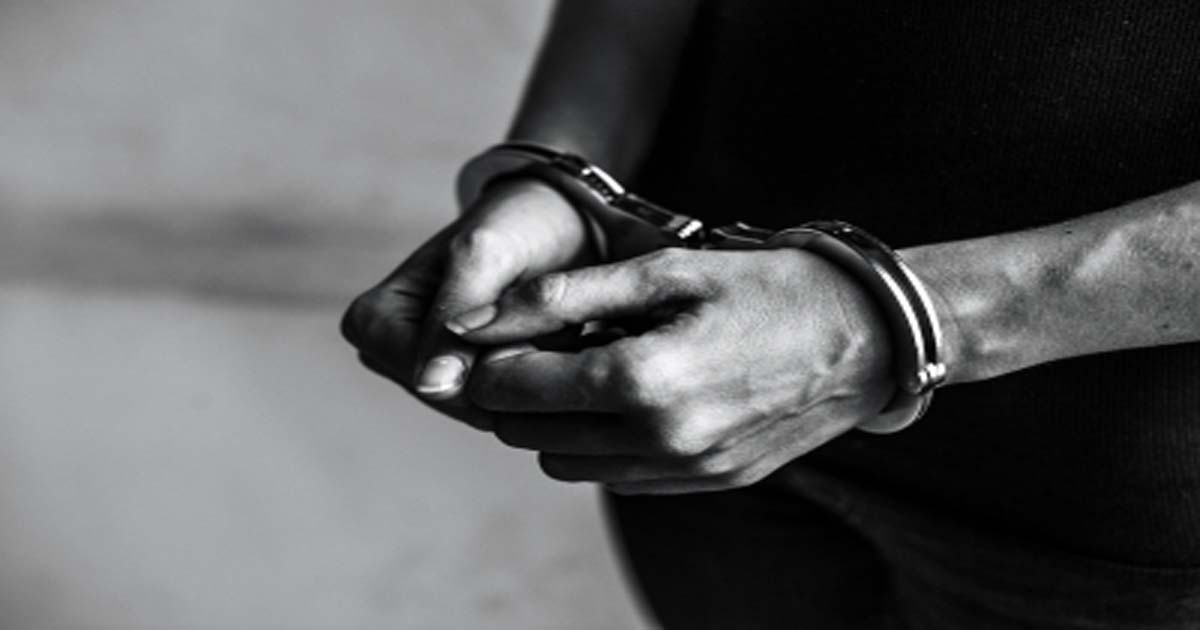
New Delhi, Oct 25: Police in Maharashtra’s Satara district arrested one accused on Saturday in connection with the death of a female doctor who allegedly committed suicide after being repeatedly raped by a police officer and being pressurised by an MP to falsify medical reports of accused in cases.
According to officials, the arrested person has been identified as Prashant Bankar, the son of the doctor’s landlord whose name was mentioned in her four-page suicide note.
The deceased doctor, a native of Beed district, was posted as a medical officer at a government hospital in Phaltan, Satara. On Thursday night, she was found hanging in a hotel room under mysterious circumstances. Shockingly, she had written a suicide note on her palm, naming Sub-Inspector Gopal Badane and Prashant Bankar, accusing the police officer of rape and Prashant of mental harassment.
After Prashant’s arrest, police said he will be produced before the court and his custody will be sought for further investigation. Meanwhile, Sub-Inspector Badane has been suspended, and a detailed enquiry is underway. Both accused have been booked at the Phaltan Police Station. Satara SP Tushar Doshi confirmed that the rape allegations and Prashant’s role are being thoroughly investigated.
The female doctor who allegedly committed suicide left behind a detailed four-page suicide note apart from the inked note on the palm of her hand, stating that a police officer raped her four times and exerted pressure on her to issue fake fitness certificates for accused persons in police cases. It has now emerged in her note that she was allegedly under pressure not only from police officials but also from a Member of Parliament (MP) and his personal assistants.
The woman doctor, who worked as a medical officer at the Phaltan sub-district hospital, wrote on her palm that she had been raped four times by Sub-Inspector Gopal Badane and subjected to mental and physical abuse for over five months.
Originally from Beed district, the doctor had been working at the hospital for 23 months.
Gopal Badane is a police officer, while Prashant Bankar is the son of the landlord in the house where the doctor lived.
She had complained 21 times to various authorities, but no action was taken against her tormentors.
Recounting a particular instance in her note, the doctor said she had refused to issue a certificate and two personal assistants of an MP had come to the hospital and made her speak to him over the phone. She stated in her note that during that conversation, the MP had threatened her indirectly.
Her cousin also made similar allegations about the doctor being made to falsify medical certificates.
-

 Crime3 years ago
Crime3 years agoClass 10 student jumps to death in Jaipur
-

 Maharashtra1 year ago
Maharashtra1 year agoMumbai Local Train Update: Central Railway’s New Timetable Comes Into Effect; Check Full List Of Revised Timings & Stations
-

 Maharashtra1 year ago
Maharashtra1 year agoMumbai To Go Toll-Free Tonight! Maharashtra Govt Announces Complete Toll Waiver For Light Motor Vehicles At All 5 Entry Points Of City
-

 Maharashtra1 year ago
Maharashtra1 year agoFalse photo of Imtiaz Jaleel’s rally, exposing the fooling conspiracy
-

 National News1 year ago
National News1 year agoMinistry of Railways rolls out Special Drive 4.0 with focus on digitisation, cleanliness, inclusiveness and grievance redressal
-

 Maharashtra12 months ago
Maharashtra12 months agoMaharashtra Elections 2024: Mumbai Metro & BEST Services Extended Till Midnight On Voting Day
-

 National News1 year ago
National News1 year agoJ&K: 4 Jawans Killed, 28 Injured After Bus Carrying BSF Personnel For Poll Duty Falls Into Gorge In Budgam; Terrifying Visuals Surface
-

 Crime1 year ago
Crime1 year agoBaba Siddique Murder: Mumbai Police Unable To Get Lawrence Bishnoi Custody Due To Home Ministry Order, Says Report





